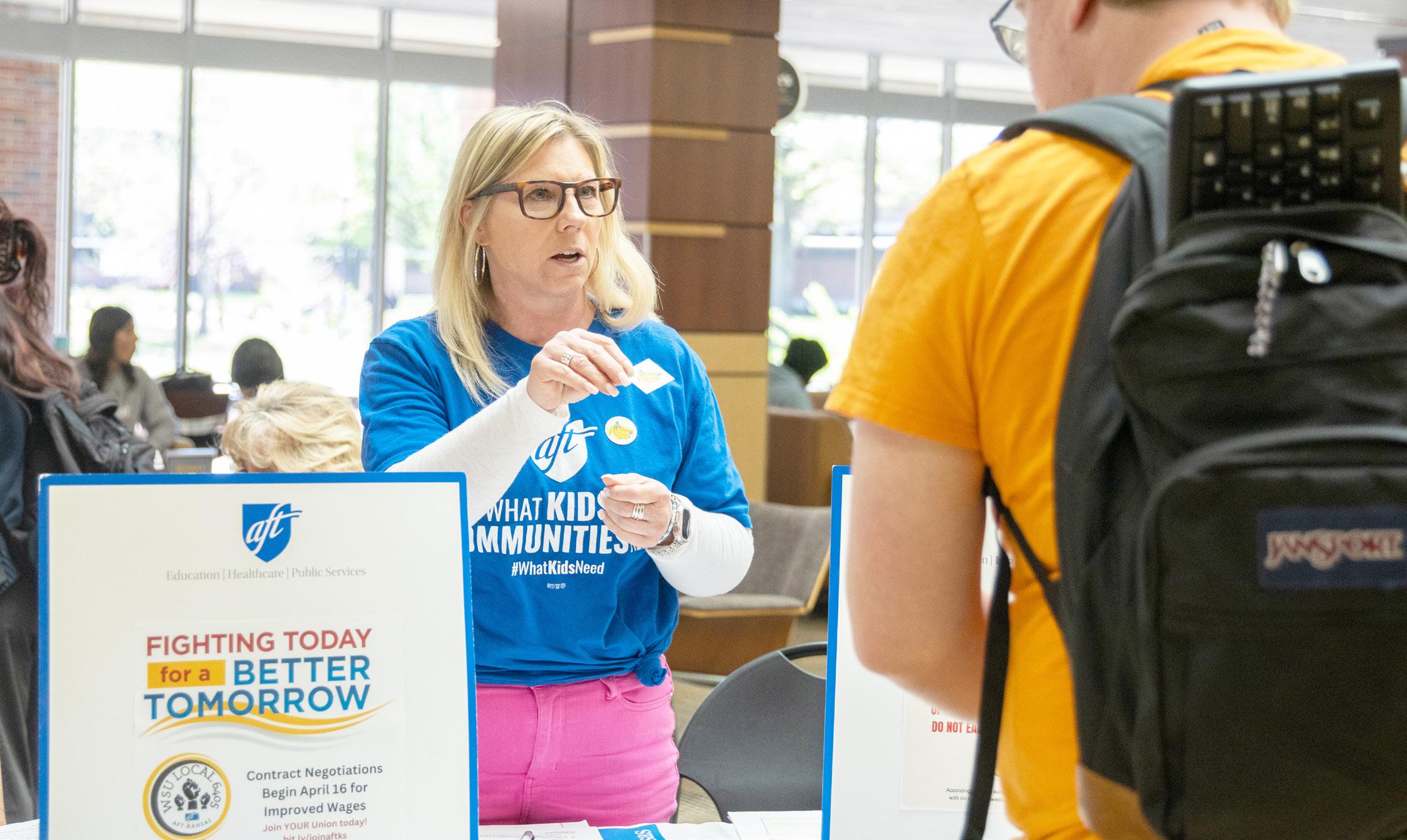

‘IT’S BANANAS WHAT THEY PAY US’
Unionized university staff gear up for pay negotiations
BY AINSLEY SMYTH news@thesunflower.com
A small group, primarily of WSU employees, handed out banana stickers to people at Wichita State’s student center on Tuesday, telling recipients to wear them the following day. The bright yellow symbols were intended to show support for facilities and housing staff.
“It’s bananas what they pay us,” Logan Mueller, who works as facilities staff overnight at WSU, said, explaining why bananas were chosen as a symbol to advocate for better pay.
Mueller also serves as the treasurer for WSU Local 6405, the Wichita State division of the American Federation of Teachers, representing facilities and housing staff.
Each year, 6405 negotiates to increase pay for those they represent, a process that started on Wednesday. According to its website, WSU Local 6405 represents 131 employees but declined to say how many are members of the union.
Lainie Mazzullo-Hart, WSU’s director of strategic communication, said the university’s goal is to reach an agreement that “balances the needs and wellbeing of our employees with the fiscal responsibilities and operational priorities of the institution.”
Amy Jensen is the Kansas director of member services for the union. She said that its goal is to get market-based compensation for the employees it represents. This would mean that, on average, their pay aligns with that of other individuals with similar jobs and skills.
Market-based compensation has been discussed among universities represented by the Kansas Board of Regents — the body that oversees public higher education in the state, including WSU, for several years. WSU’s goal is to raise compensation gradually, prioritizing some groups of faculty
and staff to get closer to market-based pay.
According to a KBOR report from January, facilities and housing staff, aside from facilities management, are not WSU’s priority when it comes to achieving marketbased compensation.
Wichita State is also expecting a $4-5 million budget deficit for fiscal year 2026, a challenge that President Richard Muma has said will not dull its commitment to its market-based compensation plan.
Jensen said, however, that the university can increase pay if it commits to doing so.
“In order to bring everybody up to market-based pay, it’s going to cost them money, but Wichita State has a $794 million budget,” Jensen said. “There’s money in reserves. They have money (that) they can move, if necessary.”
In 2025, WSU raised employee pay by 1% across all staff and faculty.
“1% is 15 cents (for employees making around $15 an hour),” Jensen said. “If you’re making $15 that’s not going to increase your ability to pay your rent, buy groceries — buy a dozen eggs, for example — put gas in your car, buy your tennis shoes.”
Mueller said that starting pay for custodial and maintenance staff is currently just over $15 an hour. After working for WSU for 10 years, he said he makes around $18.25.
According to MIT’s Liveable Wage Calculator, the hourly wage a fulltime employee in Kansas would need to make in order to support themselves is $21.06.
Mueller said many WSU staff work multiple jobs to support themselves; he drives for Lyft and said colleagues work at grocery stores or factories.
“A bump in pay will help them,” he said. “You know, maybe they won’t have to work a second job.”
Jensen said an increase in pay would also mean more people staying at WSU.
“There is a little bit of a shortage of employees,” he said. “There’s definitely a shortage of custodial (staff). If we give them more pay, maybe that’d get more people to apply here.”
Emily Patterson, executive director of facilities planning, and David Miller, senior vice president for administration, operations and finance, did not respond to attempts to contact them. Mazzullo-Hart provided a statement on the university’s behalf.
“Throughout this process, the university will continue to prioritize transparency, open communication and a commitment to fostering a positive and supportive working environment for all staff,” Mazzullo-Hart wrote.
SGA makes several changes to how it allocates funding
BY AINSLEY SMYTH news@thesunflower.com
Wichita State’s Student Senate spent the better part of two meetings discussing several proposed changes to procedures for funding students and organizations. At its Wednesday night meeting, the Senate failed the bill, only to bring it back 30 minutes later to keep debating. The bill will make a number of changes, including lowering caps on funding for some organizations, raising other caps and taking the responsibility of approving funding away from the Senate.
Joseph Roberts, a former engineering senator and current officer of WSU’s Formula SAE team, spoke against the bill at the meeting. In particular, Roberts opposed a $20,000 cap on “exceptions” to normal funding rates, calling it “harmful to the health and future of student life on this campus.”
“These student organizations are not sitting on piles of cash,” Roberts said. “They’re stretching every dollar they have to host events, travel to competitions, build things, rent venues, buy materials and feed the dozens, sometimes hundreds of students who engage with them. The organizations here that ask for larger budgets aren’t doing it for vanity; they’re doing it because their work has real reach … These groups bring value to their entire campus.”
According to SGA’s treasurer, Jia Wen Wang, the cap was set according to the non-formal maximum amount of funding that the Finance Commission grants.
MAXIMUM FOR ORGANIZATIONS
SGA considers funding requests from organizations based on a three-tier system. Tier one organizations have monthly meetings, tier two have on-campus events in addition to meetings and tier three are organizations that participate in conferences or competitions.

The act decreased the maximum amount for Tiers 2 and 3; from $7,500 to $5,000 and $15,000 to $10,000, respectively. The rule states that exceptions to the Tier 3 limit, which are now not to exceed $20,000, can be made by the treasurer.
A few senators expressed concern about the cap on exceptions, echoing Roberts’ argument. But others spoke in favor, arguing that the change was practical based on how much organizations typically receive, and would place a check on irresponsible spending in the future, especially considering the funding challenges SGA expects to face.
Sen. Josh Mallard said the cap would help ensure that smaller organizations are not left without funding.
Shocker cheer team wins national championship
BY JACOB UNRUH sports@thesunflower.com
For six months, Wichita State’s cheer team has perfected a two minute and 13 second routine — showing up to the Heskett Center four days a week at 5:45 a.m. to practice every tumble and shout. The work paid off on Saturday when WSU won the National Cheerleaders Association Championship.
“Twenty individuals looking exactly the same at the exact same time takes a lot of time to put it
together, but they did it,” said head cheer coach April Banwart.
“They paid attention to all the details. They did everything we asked them to do, and came home with a title for it.”
Wichita State finished with a total score of 97.5, two points ahead of second-place VCU. The Shockers prevailed over 291 other Division I teams and finished fourth among all divisions that attended the competition in Daytona, Florida. When the team’s van returned to Wichita, they were greeted by
dozens of friends, family and fans who carried signs and hollered in support of their win.
“The people who love us make it all worth it,” said Elise LeGrand, a sophomore and the cheer captain, to the crowd. “And especially in Daytona, we have so many parents and, like, fans and team members and everyone’s supporting us. And I think that, that is half the reason why we were so successful. So thank you so, so, so much.”
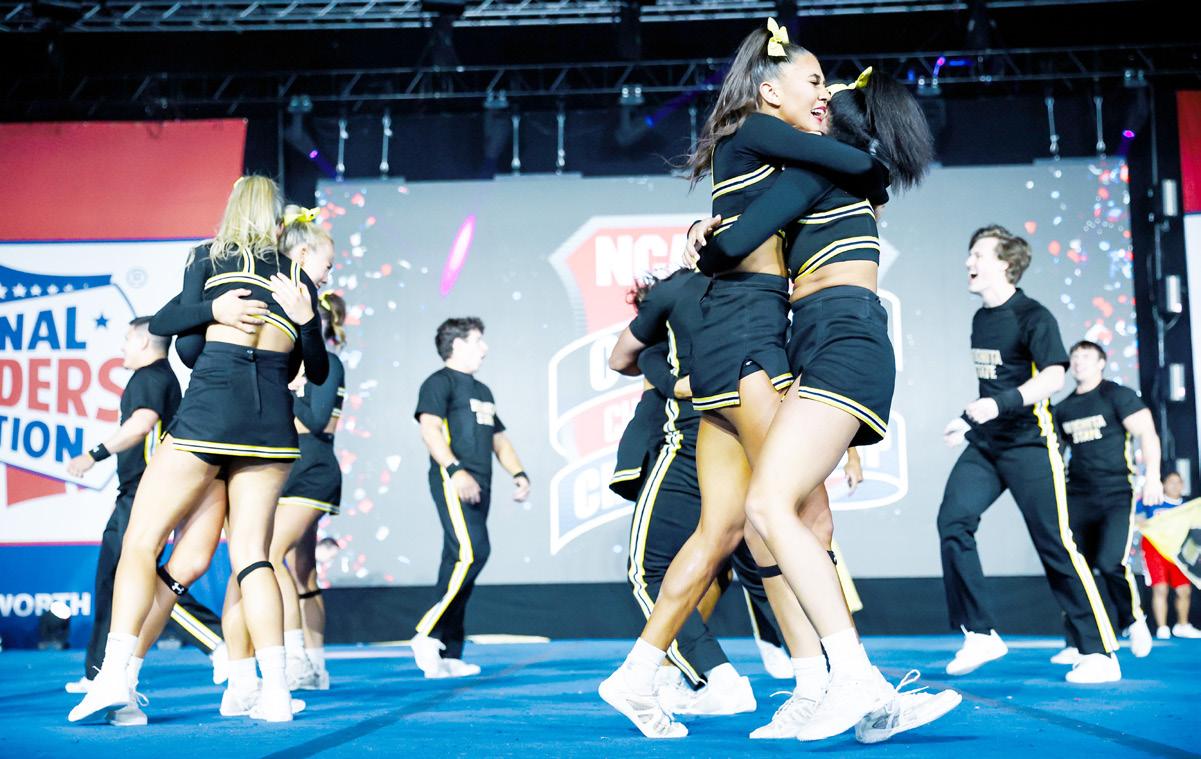
AFT Kansas Director of Member Services Amy Jensen gives a banana sticker to Joe Hanford. Jensen passed out stickers to passersby in the Rhatigan Student Center, asking them to show their support for the union’s request for increased wages. |
Photo by Allison Campbell / The Sunflower
Photo courtesy Wichita State Athletics
Illustration by Savanna Nichols / The Sunflower
UP IN FLAMES
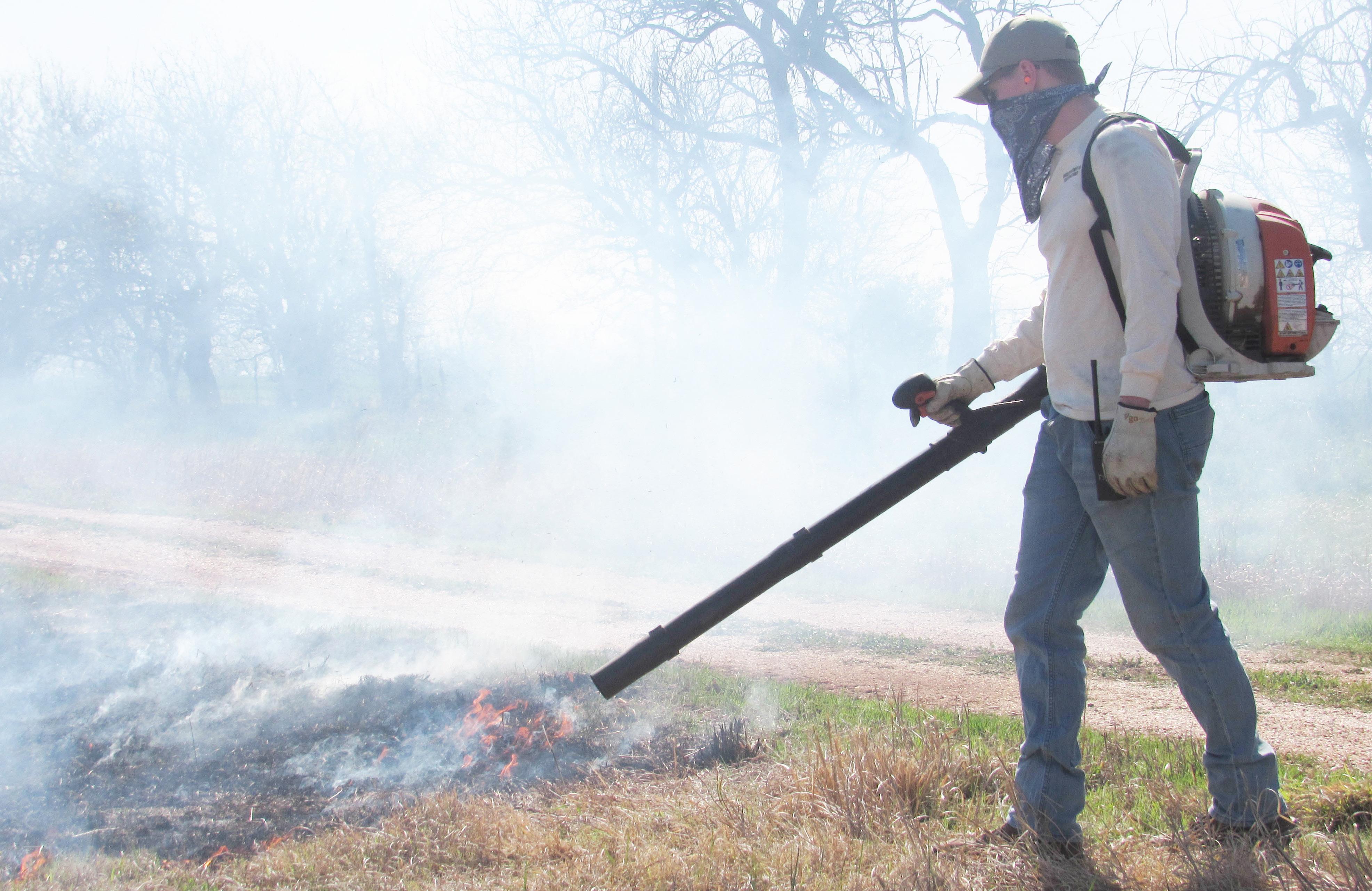
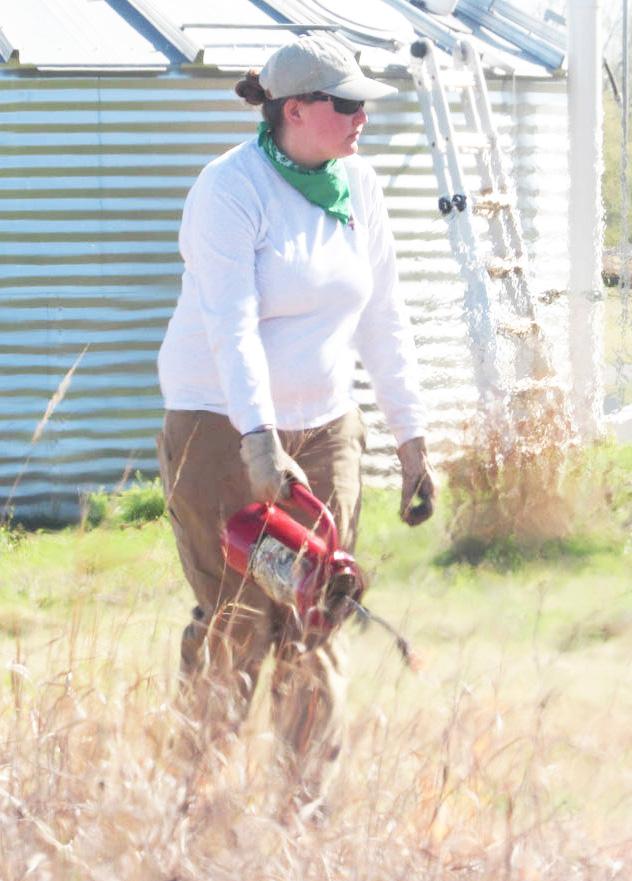
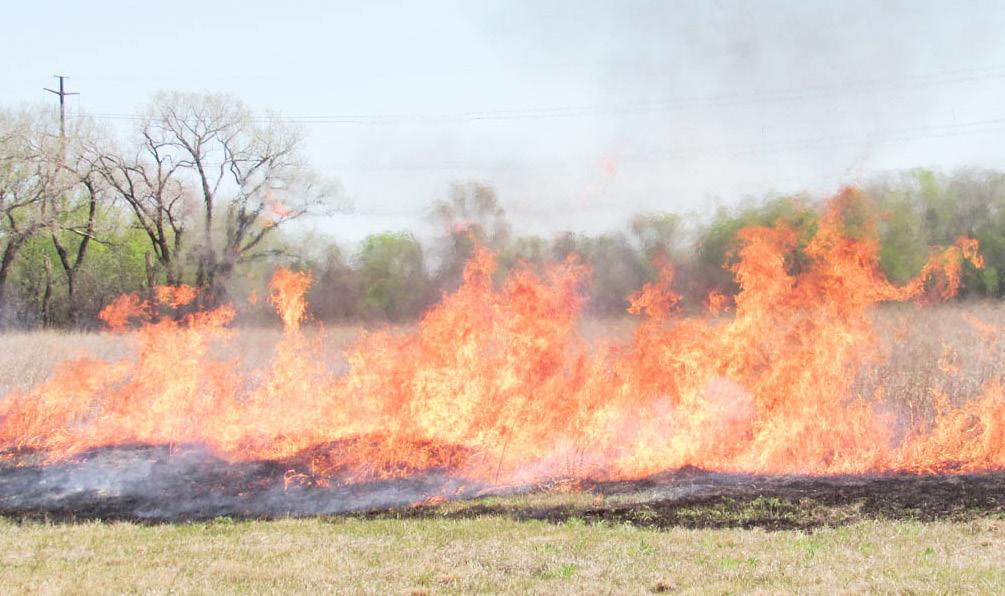
Students help with controlled burns in rural Kansas
BY SOPHIA BEST
sophiadabest@gmail.com
There is a lot Wichita State students can do to help the environment: joining the Green Group, a sustainability organization, remembering to recycle on campus, or, like biology student Alex Dudley, they can volunteer with WSU’s field station to conduct controlled burns.
“Watching the fire is really cool,” Dudley said. “But I think knowing what we’re doing for the grasslands is my favorite part … being able to take part in that, and help the ecosystem.”
Located in Viola, Kansas, the WSU Ninnescah Reserve field station is dedicated to researching methods of restoring and maintaining prairie ecosystems, including prescribed fires.
Before every controlled burn, field manager and burn boss Dexter Mardis takes the team through safety
procedures. Then he assigns roles.
The various roles volunteers can be tasked with include “igniters” who drag a torch along a line to start and keep the fire going, “blowers” who use gas-powered leaf blowers to extinguish flames to establish a blackline — a barrier preventing the fire from spreading outside the prescribed area — and people who drive trucks and Gator utility vehicles to transport people and water pumps.
Brett Riffel, a senior biology major, worked mainly as an igniter for his first burn on April 11, following Mardis’ instructions to create a blackline to make sure the fire didn’t burn outside of the designated area.
“It was really fun,” Riffel said. “I kind of knew about prescribed burns in Kansas, but never really got to participate in one. It was kind of what I was expecting, and a little bit
MISSION The Sunflower — both in print and online — will be a timely resource of information about the Wichita State University community. It will report on news, issues, activities, academics and athletics, in addition to offering a forum for discussion, reviews and commentary. It will also be an effective learning experience for students, who will have the final authority over what is published. The Sunflower is a member of the Associated Collegiate Press, College Media Association and the Wichita Journalism Collaborative.
more. My favorite part was lighting the fire — I’m a bit of a pyrotechnic.”
Tommy Huela, a biology student focusing on environmental science, worked as both a blower and an igniter at the burn. It was his third burn.
“(Controlled burns) are quite important,” Huela said. “You should not be so concerned when they happen, it’s a natural process to keep the grasslands the way they are.”
While controlled burns have many benefits for maintaining natural landscapes and preventing wildfires, according to the Western Fire Chiefs Association, they can also raise concerns about air and water quality, as well as potential safety risks when not properly handled.
Controlled burns are an important, yet demanding part of keeping the grasslands maintained, requiring time, effort and closely watching the weather. Even the
slightest change in wind conditions can cause a burn to be canceled, as Mardis canceled a previous burn due to a burn ban being put into effect.
“It’s really hard and exhausting, but it’s pretty fun … It’s just being out, hiking and setting things on fire,” Mardis said.
Despite the intense conditions and demanding work, Mardis said he finds helping with prescribed fires to be worth it.
“There’s a lot of students I don’t otherwise interact with, except when they’re out here. It’s fun to get to know them,” Mardis said. “I think the most rewarding part is knowing that it helps the ecosystem and environment be more natural.”
Mardis said all WSU students are welcome and encouraged to volunteer for a prescribed burn. Students can email dexter.mardis@ wichita.edu for more information or to sign up.

EDITOR-IN-CHIEF
BURN TERMS
BURN BOSS
A state certified person who plans controlled burns, obtains the permits needed, oversees the burning and monitors the effects afterward.
IGNITER
People who drag a torch along a line to start and keep the fire going.
BLOWER
People who use gas-powered leaf blowers to extinguish flames to establish a blackline and people who drive trucks and Gator utility vehicles to transport people and water pumps.
BLACKLINE
A barrier preventing the fire from spreading outside the prescribed area.
Graduate student Parker Binns acts as a blower at the prescribed fire. Students can volunteer with WSU’s field station to conduct controlled burns in the state. | Photos by Sophia Best / The Sunflower
Biology major Alex Dudley acts as an igniter at the prescribed fire.
NOW CLEAR-LY I CAN SEE

State literacy initiatives shape School of Education
BY RILEY SIPES
rsipes03@icloud.com
Based on 2024 state testing scores, about 33% of Kansas third graders exhibit limited literacy skills. This is a significant jump from 2015, when only 20% of students fell into this margin.
To deplete this gap, Gov. Laura Kelly signed the Kansas Blueprint for Literacy into law in April 2024. This plan provides funding to select universities, including Wichita State, ensuring teachers are trained to provide K-12 students with up-to-date reading instruction backed by the science of reading, a cumulative body of research illustrating how children learn to read. One year in, the plan is shaping how WSU instructs future teachers.
ADDITIONAL RESEARCH IGNITES CHANGE
Since 2000, when the National Reading Panel Report was released, the science of reading has been the primary source of literacy instruction for WSU’s School of Education. It has evolved since its conception.
“Over the last two decades, the body of research has grown,” said Kimberly Wilson, professor and coordinator of the Master of Arts program for Teaching in Early Childhood and Elementary Education. “We have additional research, we have brain mapping and we have all of these additional sets of studies that really tell us these are the skills kids need to have to be successful readers.”
The term “structured literacy” is derived from this additional research and describes the intentional order in which literacy should be taught.
“It’s just been coined structured literacy because one of the very first principles is (that) it needs to be systematic and explicit,” Wilson said. “We need an order in which we’re going to introduce letters and sounds. We need a method by which we’re going to teach heart words (sight words, or simple words taught to children through memorization).”
In response to the Blueprint for Literacy, the College of Applied Studies at Wichita State is beginning a variety of new initiatives to support future teachers and beyond. They are launching the Collaboration for Literacy Education, Advancement and Research along with new professional development opportunities for in-service educators.
According to Wilson and Jennifer Friend, the dean of the College of Applied Studies, the initiative provides solutions and accommodations for literacy-related issues under one centralized hub.
“The CLEAR initiative is a collaborative effort where there are more intentional
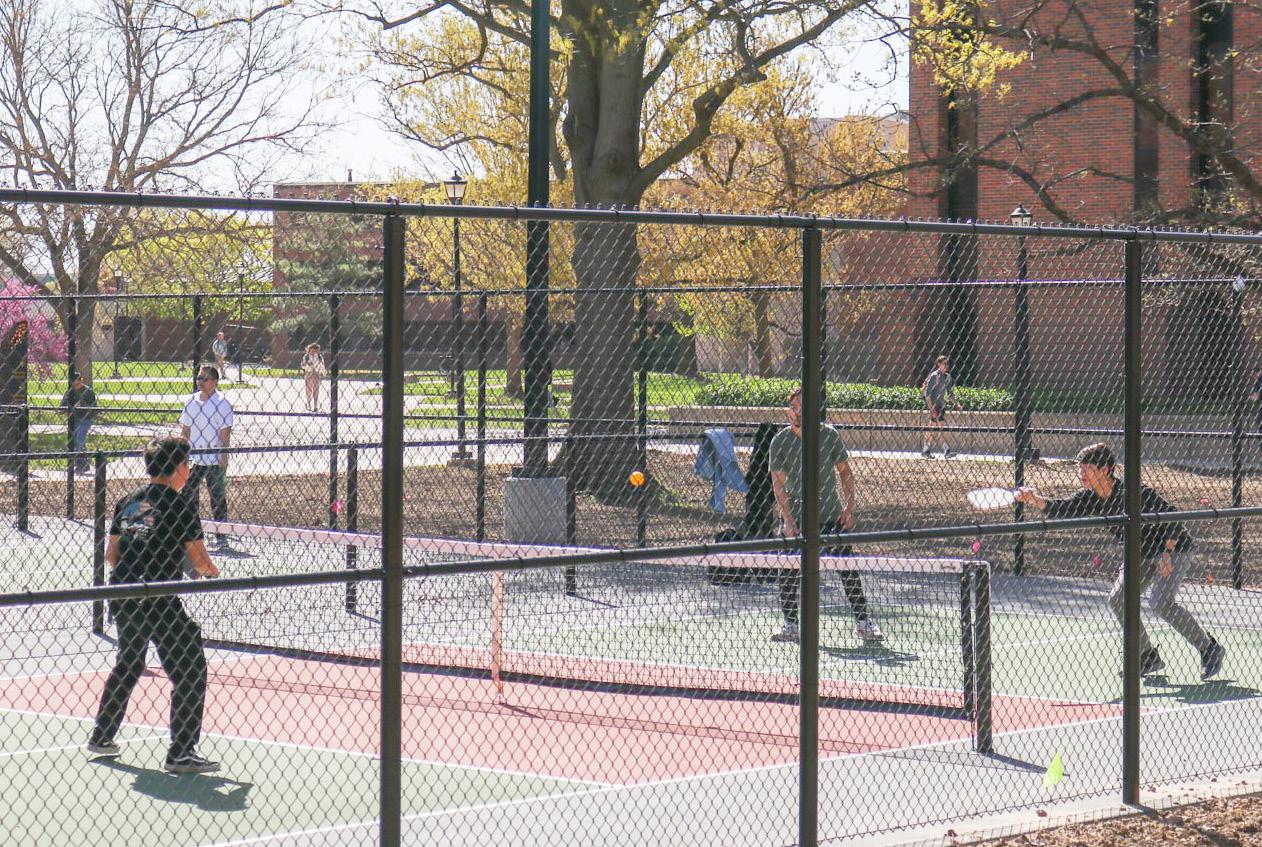
Here’s what students asked university leadership at recent virtual town hall
BY AINSLEY SMYTH news@thesunflower.com

partnerships with districts within our catchment area, not just USD 259,” Wilson said. “We love 259, but there are other districts within this catchment area that would benefit from this type of collaborative partnership.”
UPDATED TRAINING OPPORTUNITIES
Elementary education majors at WSU are already required to take courses that teach the science of reading, but CLEAR will provide supplementary resources to teachers who graduated before that standard was implemented, said Friend.
This aspect of CLEAR aligns with the blueprint’s requirement that all elementary-certified teachers earn a “seal of literacy.”
Having the seal of literacy, Friend said, confirms that teachers are knowledgeable about the science of reading and structured literacy.
“That demonstrates to the state of Kansas that we don’t have anybody who’s still out there in a classroom who is using outdated methods; things that we know are not effective in teaching reading,” Friend said.
CLEAR would also provide paraprofessionals with resources to learn about the science of reading.
“Some (paraprofessionals) have no advanced training; nothing beyond high school, besides perhaps, what their district may offer for para training,” Wilson said. “We’re offering a series of three, onecredit-hour courses at Wichita State to support paras and their work with struggling readers so that we can increase their content knowledge and their practice in using science-based pedagogy.”
SUPPORT OUTSIDE THE CLASSROOM
The second aspect of CLEAR focuses on direct services to
individuals struggling with reading and their families.
“Right now, a family might have to go and pay $1,000 to get their child assessed to see whether they have dyslexia or to see what’s causing them to struggle as a reader,” Friend said.
WSU students will perform those assessments, getting an opportunity for paid applied learning.
“Sometimes with reading difficulties, there are some social-emotional components,” Wilson said. “The older a child gets, they know if they are not a strong reader, and it affects selfesteem; it affects self-efficacy. So in partnership with the (YMCA), there might be support for that.”
BLUEPRINT FUNDING
The College of Applied Studies is launching its first in-service educator course this summer and the CLEAR literacy initiative will launch once a Memorandum of Understanding from the Kansas Board of Regents is signed. The future of these initiatives is uncertain though.
“My understanding is there’s a new set of legislators in Topeka this year who were not a part of the group that approved the funding last year, and so, Kansas Blueprint money has been taken out of the budget,” Wilson said.
In 2024, the Kansas Legislature allocated $10 million to the KBOR to carry out the Blueprint for Literacy this year. However, new Kansas legislators have stripped blueprint funding for the 2026 fiscal year, destabilizing the longevity of these programs.
“Those funds (from the previous year) have to be spent by June of 2026, which at that point, then it’s up to me to make sure we have funding for stuff to continue,” Wilson said.
Wichita State University leadership addressed several issues relating to campus in a virtual town hall with student government leaders on Thursday. The president, provost and vice president for Student Affairs said they are continuing to monitor changes on a state and federal level, as well figuring out how to address a looming budget shortfall and student concerns around parking, inclement weather and accessibility.
Students had the chance to submit questions, which were then asked by Student Body President Kylee Hower and Vice President Mathew Phan during the town hall.
ENROLLMENT CHALLENGES
In response to a question about the biggest challenges facing universities and how WSU can address them, Provost Monica Lounsbery listed shifts in the demographics of students and the drop in enrollment that is widely expected across universities.
Lounsbery pointed to the fact that, worldwide, populations are growing older. The provost said she thinks the impact of this enrollment cliff, and more people weighing the value of higher education, will result in fewer students attending universities.
“That means fewer students are coming through the pipeline,” she said. “It also means because older adults have a tendency to retire, there’s going to be a demand for workforce and people are going to have pressures to join the workforce earlier. I think that’s an extraordinary challenge that there’s no way around.”
But, she said that WSU’s paid applied learning opportunities are unique and will help the university continue to attract students despite these changes.
BUDGET SHORTFALL
President Richard Muma recently sent out a message to staff and faculty, saying that the university is facing a shortfall for the next academic year and will be tightening budgets as well as likely raising tuition by almost 4%.
“Every year, the university must present a balanced budget. We do not carry debt forward,” Muma said. “And so that’s what we’re trying to do.”
Muma expanded on some of the causes of the shortfall, adding that this year, WSU received the last payment of federal aid to help transition from COVID-19.
He also cited a decline in international enrollment, other demographic changes related to the enrollment cliff and a stagnant funding rate from the state.
Addressing the tuition increase, Muma said, “We’re trying to minimize that as much as possible.”
Overall, Muma said that tightening budgets will allow the university to “discover some inefficiencies,” and Lounsbery added that offerring new programs may help increase recruitment to bring in more revenue.
They also touched on the NCAA’s House settlement, one of the upcoming financial challenges

Muma had addressed in his recent announcement.
“We are very committed to having a high quality athletic program, so we’re not changing that,” Muma said. “And so we’re trying to figure out how best to position our athletic program going forward.”
The court case requires universities to reimburse athletes from the last 10 years for use of their name, image and likeness, as well as pay athletes for that use going forward.
Muma said being competitive in those payments, along with ongoing investments in new facilities, will help the university maintain the quality of its athletics.
CHANGES TO CAMPUS
Muma and Lounsbery discussed several changes happening on campus, and others that are upcoming.
Muma said there are several ongoing construction projects related WSU’s master plan: a Bureau of Alcohol, Tobacco, Firearms and Explosives facility, the Hub for Advanced Manufacturing Research, an upgraded facility for WSU softball, renovations of University Stadium, formerly Cessna Stadium and newly opened pickleball courts.
Muma also discussed the Wichita Biomedical Campus, a partnership between WSU, WSU Tech and the University of Kansas that is slated to open in 2027.
In addition to new construction, Muma said the Brennan Hall buildings will be demolished within the next six months, followed by Neff Hall. He confirmed that the Holmes Museum of Anthropology, currently housed in Neff Hall, will be moved into Ablah Library while the rest of the anthropology department moves into the Geology Building.
Muma said that these demolitions and movement of departments and services are important to “develop new spaces” for faculty, staff and students and to manage deferred maintenance.
INCLEMENT WEATHER
WSU’s inclement weather policy has repeatedly sparked debate among faculty and staff over multiple years.
Lounsbery said that while the university will consider whether people can safely get to campus when inclement weather occurs, “cold weather alone” is not likely to cause the university to move to remote operations.
“We are an applied learning university,” Lounsbery said. “And that means that many of our students are in field experience, and their learning is really part of doing and you can’t really do those kinds of things remotely.”
A screenshot of the April 10 virtual town hall. | Courtesy of the Student Government Association
Students play pickleball on the newly opened courts. The grand opening of the new pickleball courts was held on April 10. | Photo by Preston Caylor / The Sunflower
Kimberly Wilson, a professor in the department of Intervention Services & Leadership in Education (ISLE), introduces the Kansas Blueprint for Literacy and the Center for Literacy Education, Advancement, and Research (CLEAR) initiatives to Faculty Senate. According to Wilson’s Jan. 13 presentation, Kansas Blueprint for Literacy and CLEAR hope to help 90% of Kansas students reading at or above grade level by 2033. Photo by Allison Campbell / The Sunflower
Photo illustration by Allison Campbell / The Sunflower

Men’s basketball signs 3-point sniper in transfer portal
BY JACOB UNRUH sports@thesunflower.com
Wichita State men’s basketball landed its second transfer of the offseason — and second from the Southern Conference — on Saturday.
Kenyon Giles, a junior guard who played for UNC Greensboro last year, committed to the Shockers, according to a post from his agency on X, formerly known as Twitter.
Giles is a proficient sniper from 3-point range. He knocked down 80 3-pointers on 40% shooting last season, both of which would have led Wichita State by a wide margin. 53% of his shot attempts were from beyond the arc. Giles’ 3-point shooting percentage jumped by nearly 10 points between his sophomore and junior seasons.
He averaged 15.3 points, 2.9 rebounds and 1.8 assists per game last year while only turning the ball over 22 total times.
Giles is on the shorter side at 5-foot-9. He is from Virginia and played for two seasons with Radford in Virginia before transferring to UNC Greensboro last offseason. He primarily played as a shooting guard for the Spartans.
Wichita State was Giles’ only recruiting visit. The Shockers still have five scholarship spots remaining for their 2025-26 roster.

Women’s basketball lands Wichita native in transfer portal
BY OWEN PROTHRO owenprothro@gmail.com
For the second straight offseason, Wichita State women’s basketball landed a graduate student from Wichita in the transfer portal.
Jaila Harding, a 5-foot-8 guard who went to Wichita Southeast High School, signed with the Shockers on Friday via an announcement on X. Harding spent the last two seasons with New Mexico State where she averaged 8.8 points per game. She shot a 38% field goal percentage, a 36% 3-point percentage and an 80% mark at the free-throw line. During her junior season, Harding was named an AllConference USA honorable mention and scored a Division I career-high of 22 points against UTEP.
Harding is a high-volume scorer from beyond the arc. She made 61 3-pointers last year, which would have led Wichita State, and her shooting percentage would have ranked second on the team. 56% of Harding’s shots came from long range. Before playing for the Aggies, she attended Butler Community College and averaged 9.2 points and 4.1 rebounds per game.
Harding is WSU women’s basketball’s first transfer addition of the offseason. The transfer portal closes on April 22.
MIRRORED EXPERIENCES, OPPOSITE PERSONALITIES

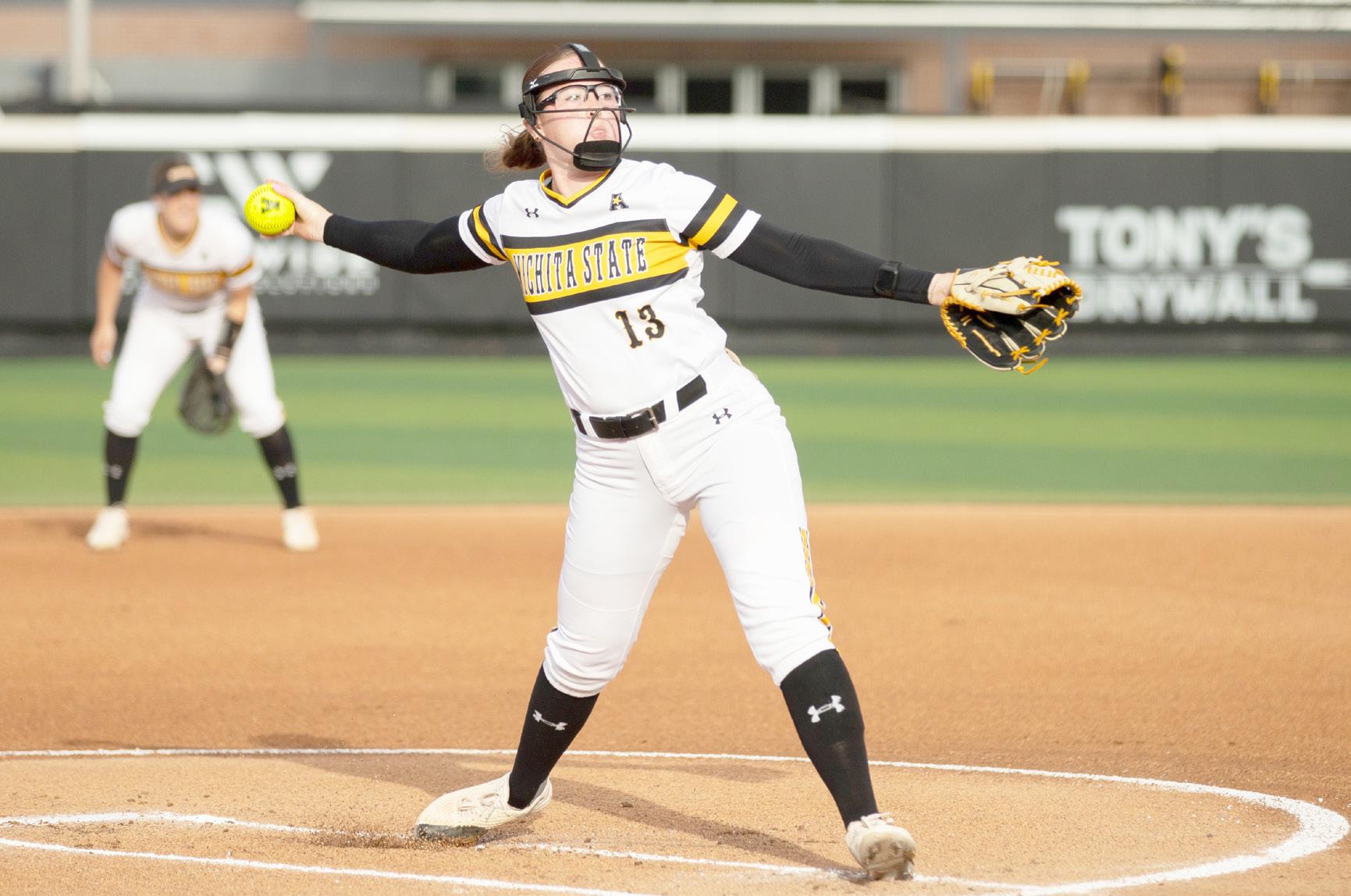
How high school softball rivals became friends, roommates at WSU
JACOB UNRUH sports@thesunflower.com
The first time Gabby Scott faced off at the plate against Ryley Nihart in high school, she hit a home run.
After that, Scott began to struggle against the young pitcher whom she would often face because they played in the same district. Scott said this developed into a dislike for Nihart.
“I just did not like her because she was just so good and she was one of my least favorite pitchers to hit off of,” Scott said. Today, Scott sees plenty of Nihart’s pitching — not as a hitter, but as a catcher for her at Wichita State. The freshmen are softball teammates, roommates and have become good friends.
Nihart hails from Alvin, Texas, while Nihart is from Engleton, a half-hour drive away from Alvin. Upon their arrival at Wichita State, neither was expected to make a major impact.
However, both Scott and Nihart have grown into key roles on the team as they’ve also grown their relationship with each other.
MIRRORED EXPERIENCES
Nihart and Scott both struggled during the fall season, with a mirroring root cause: a lack of confidence.
Nihart said she struggled to adapt to college softball. She is at her best when she hits her spots and trusts her defense — but when she played during the fall, she said she was doing too much.
It wasn’t until the winter break that she found herself.
One day, Scott was catching Nihart during a bullpen session.
Noticing her struggles, Scott told Nihart to find the pitcher that she had struggled to hit back in high school.
“She was like, ‘You were a completely different person than (you were in high school), like, ‘Where’s that girl?’” Nihart said. “‘Like, you need to bring her back out.’ And I think that’s kind of when I realized, too, like, okay, I need to go back to what I knew that I could do and what I was good at.”
Scott similarly struggled early in the year. Between being away from her family for the first time, lingering injuries and self-doubt, Scott took some time to adjust to the team. She also worried initially about making friends.
“I’ve never been the new girl to the team,” Scott said. “I’ve never had to make friends … Once I was able to build those relationships with everybody, then that’s when I got better.”
Scott started just three of the first 24 games of the year. She got another chance on March 12 against Kansas, when she went 1-2 with three RBI at the plate. Since then, Scott established firm control behind the plate, starting all 19 games.
Similarly, Nihart wasn’t expected to be a lead pitcher for the Shockers this year. However, around the same time in the middle of March, Nihart emerged as WSU’s ace starter.
She’s started 14 games, thrown 86 innings and has a 3.01 ERA — all tops on the team.
OPPOSITE PERSONALITIES
As roommates, Nihart and Scott hang out with each other a lot outside of the field.
The two have opposite personalities. Nihart is more quiet and introverted, while Scott is talkative and brash. Those differences have brought them closer together.
Scott described a dynamic with lots of laughs, but also a lot of vulnerability. She said Nihart balances her out.
Women’s bowling’s season ends at NCAA Final Four
BY OWEN PROTHRO owenprothro@gmail.com
Wichita State women’s bowling‘s first season of NCAA eligibility ended in the Final Four of the NCAA tournament.
The Shockers came into the Final Four as the No. 4 seed. On Friday, they lost to No. 1 Jacksonville State, who they beat twice in a row to win the Conference USA Championship two weeks ago, and No. 2 Nebraska. The Final Four was a doubleelimination, best-of-three Mega Match format.
With the two losses ending WSU’s season, the team finished 87-38 overall.
The Shockers lost a match for the first time since the opening round of the CUSA tournament against Jacksonville State. The teams went to a best-of-seven tiebreaker and WSU ultimately fell to the Gamecocks, 2-1.
Before the best-of-seven, the Shockers nabbed the traditional match with a 1,052-1,018 win. Jacksonville State then rallied to win the total pinfall baker match by taking four of the five games. The Gamecocks barely held on, however, and won by 30 to send it to the best-of-seven tiebreaker. WSU started strong and won the first game, 231-216. The teams went back and forth from there and eventually pushed it to game seven. Jacksonville State held on to take the game and match, 4-3.
In the sixth and seventh games of the tiebreaker, the Shockers put up their worst scores of the match, 163 and 171 respectively. On the other lane, the Gamecocks managed its second and third-best scores in those games, 235 and 233 respectively, to win the match.
In the double-elimination side of the bracket, WSU met a quicker fate against Nebraska, losing 2-0. The Shockers lost their first traditional match during their NCAA Championship run, 1,050-985.
“She’s very mindful, she’s very shy and very quiet,” Scott said about Nihart. “I am not any of those things whatsoever.”
Nihart’s cautious nature sometimes puts the more impulsive Scott in check. Nihart described lying in bed at night in the quiet before Scott asked a random, off topic question.
“I’m like, ‘Gabby, like, why did you think of this? Or why are you talking about this?’” Nihart said. “But she’s great. She makes me laugh every day.”
BATTERY MATES
Nihart and Scott’s friendship off the field leads to better communication as a pitchercatcher combination on the field.
Sometimes, that means the ability to be brutally honest without resulting in hurt feelings. When Nihart throws a meatball, Scott will joke that the imaginary hitter sent the ball to the other side of campus.
“She has said that a couple times in the bullpen, actually, and it just makes the whole bullpen laugh,” Nihart said.
But Scott can also be supportive. Nihart said she’s able to calm her down in the circle and build confidence during tough situations.
“I think she really believes in me,” Nihart said.
Scott said she makes those jokes to lighten the mood when providing feedback.
“Sometimes you can still find a way to make fun out of it,” Scott said. “Like, when she throws the ball down the middle, I’m like, ‘That’s going dead center seven hundie. Like, hello. We can’t have that.’”
Overall, their friendship bears fruit in their performance on the field.
“It’s just like, we just get each other on a deeper level,” Scott said.
The Cornhuskers built a 39-pin lead after game one of the baker total pinfall match, 256-217. The Shockers picked up two of the next three games but needed a big game five to make up a 47-pin deficit, 880-833.
WSU won in the fifth game, but not by as many as was needed to force a best-of-seven match.
AJ McGinnis adds name to transfer portal
BY OWEN PROTHRO owenprothro@gmail.com
Another surprise name from Wichita State men’s basketball entered the transfer portal on Monday afternoon.
According to a post on X, formerly known as Twitter, from Verbal Commits, fifth-year guard AJ McGinnis threw his name in the hat that is the NCAA transfer portal. It has not been confirmed whether McGinnis has received another year of NCAA eligibility. McGinnis spent one season in the Roundhouse and averaged just 3.8 points per game. He shot at a 39% rate from the floor, which includes a 35% mark from deep. 81% of his shots came from 3-point range.
McGinnis is a career 36.3% 3-point shooter and holds a career 41.1% field goal percentage.
Before WSU, McGinnis played one season at UNCG before transferring to Cincinnati. After his time with the Bearcats, he transferred to Lipscomb for two seasons before coming to Wichita. Like forward Zane Meeks, who entered the transfer portal last week, McGinnis is in search of his fifth school and sixth season of collegiate basketball.
McGinnis also joins center Quincy Ballard, guard Yanis Bamba and forward Corey Washington in the transfer portal.
Photo coutresy of Wichita State Athletics
Photo coutresy of Wichita State Athletics
Freshman Gabby Scott smiles as she returns to her fellow teammates after run ruling the East Carolina Pirates on April 11. Scott secured the Shockers two RBIs. | Photos by Mia Hennen / The Sunflower
Freshman pitcher Ryley Nihart pitches against South Florida on March 28 in Wilkins Stadium. Nihart helped the Shockers achieve a 9-4 win against the Bulls in their first game of their weekend series.
Wichita State disc golf team reflects on national championship experience
BY MYA SCOTT mds.200624@gmail.com
A 34-hour round-trip car ride.
That’s what many members of the Wichita State Disc Golf Club’s competitive teams have been preparing for all year long.
And though nearly a full day of travel doesn’t sound appealing to most, members of the disc golf team were ecstatic when they heard they got to make the journey.
“I was so pleased to be able to go,” Disc Golf Club Vice President Micah Williams said. “... It’s a spring break of disc golf.”
Two weeks ago, two of the club’s competitive teams made the lengthy journey to Rock Hill, South Carolina, to compete in the College Disc Golf National Championship after the A team secured a DII, the second-highest division of disc golf in college, bid and the B team claimed a DIII bid.
The club brought two teams to the tournament and both ranked top-15, as the A team placed 14th out of 92 teams, and the B team placed ninth out of 47 teams.
Williams said he hadn’t thought he would make it to the four-day tournament this year. He said he had a feeling that only two of the three competitive teams from WSU would go. And up until this year, Williams had been a part of the C team, the team that would’ve been left out.
“I played the best I’ve played in the tryouts, made it to the second team, and then right there, I pretty much knew I was going to go to nationals,” Williams said. “But I didn’t know for sure until a couple of weeks before.”
Williams said it was “pretty exciting” to hear he and his team had made it to the national tournament, especially as he personally had been playing the sport for a long time after he fell in
Our team chemistry was great and our camaraderie on the course always brings a lot of joy to our rounds.”
REMINGTON PUTTER Player and coach, WSU Disc Golf Club “
love with it during COVID, when he was struggling to socialize in the daunting quarantine.
“I wasn’t good at it at first, but right away, I fell in love with the sport,” Williams said. “... I haven’t stopped playing since. I think the longest time I’ve ever gone without playing since then, it’s probably like a week max.”
With all the experience under his belt, Williams still said nationals “was one the greatest weeks of disc golf that I’ve been able to have in my life,” and found the long car ride “perfect.”
“I wouldn’t have it any other way,” Williams said. “It was super fun. We were laughing the whole time, making jokes, listening to some great music … The car trip added to the fun because of the great fellowship we had as a group.”
Other than the car ride, Williams found joy during an evening after they had finished their three hours of competing for the day.
“We were feeling pretty good, and we only had a little bit of time of daylight left and so we went over to this fun little course in the city,” Williams said. “We just went out there, and we were just trying to hit a bunch of holes-in-one. It was really fun because a couple of guys ended up getting a hole-in-one.
“So super fun to cheer them on again, just encourage the team and see us playing well and to be able to just enjoy it. And it was kind of
a fun way to end off the night, and I remember that one because that was the most enjoyable evening for fun the whole trip.”
Remington Putter, coach and player on the WSU team, also fell in love with the sport during the COVID era.
“Me and my roommates just playing disc golf … that’s kind of how I really started to pay attention to the sport, learn about the sport,” Putter said. “I’ve always been in athletics, and so I like to find a skill and really perfect it. And disc golf has been one that I don’t feel like I’ve perfected yet. I’m still working on it.”
Putter was the best singles performer at nationals for the WSU team, solidifying 18th place out of 181 players in the DIII side of the tournament.
Putter said it was “amazing” to compete with big names in one of the most competitive collegiate level disc golf tournaments. He said he also enjoyed the friendship the team had on and off the course.
“It was really exciting to see, exciting to be a part of,” Putter said. “... The team rounds were a lot of fun. Our team chemistry was great and our camaraderie on the course always brings a lot of joy to our rounds. Whether we’re playing well or not, we enjoy it.”
Williams said the team chemistry improved on the trip due to them spending nearly a whole week, constantly near each other.
“Not only did our scores improve, but I think just as teams, we are a lot closer between the two teams … I think it was a really good bonding experience,” Williams said.
Along with the normal bonding he experienced with the team, Williams also had an elevated kind of fellowship. After he suffered
Baseball’s pitching implodes in loss at Kansas
BY JACOB UNRUH sports@thesunflower.com
Wichita State head coach Brian Green used nine pitchers on Tuesday evening against Kansas, six of whom allowed runs. The Shocker pitching staff struggled throughout the game in an 18-12 road loss to the Jayhawks.
WSU allowed its second-most runs this season, only behind a 27-run disaster against Louisiana Tech in March. The Shockers have given up 13 or more runs three times in the past two weeks.
Wichita State dropped to 12-24 on the season, while Kansas improved to 28-10.
The Shockers out-hit the Jayhawks, 16-13. The difference was in the ability to drive runners in. Wichita State left 18 runners on base, while KU only stranded eight.
Wichita State drove Kansas’ starting pitcher out of the game in the first inning, but not before scoring four runs and taking the lead.
The Shockers pushed across another run in the second. The KU pitcher threw the ball away from first base while fielding a bunt from junior Jaden Gustafson, allowing sophomore Camden Johnson to score from second base.
Then, the Jayhawks responded in the bottom of the inning, stringing a few singles together before smoking a three-run homer to left field to take the lead, 6-5. After a quiet third inning, WSU retook the advantage in the fourth with a two-out rally. Trailing 7-6, KU woke up again in the bottom of the frame, leading off the inning with a homer off senior pitcher Owen Reynolds.
It was the first homer Reynolds has allowed this season. He proceeded to walk the next three batters.
WSU rallied for two runs in the top of the fifth inning, but Kansas immediately responded with four more to pile on the lead, 17-9.
From there, the game slowed down. WSU picked up two runs in the top of the sixth, but left two batters on base in the seventh and eighth and went down quietly in the ninth.
ON DECK
@ FAU (AAC) Thursday, April 17 5:30 p.m.
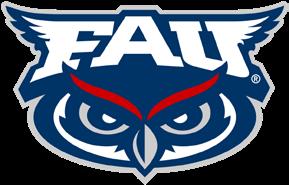
@ FAU (AAC) Friday, April 18 5:30 p.m.

@ FAU (AAC) Saturday, April 19 Noon

@ K-State Tuesday, April 22 6 p.m.

vs. USF (AAC) Friday, April 25 6 p.m.

vs. USF (AAC) Saturday, April 26 2 p.m.

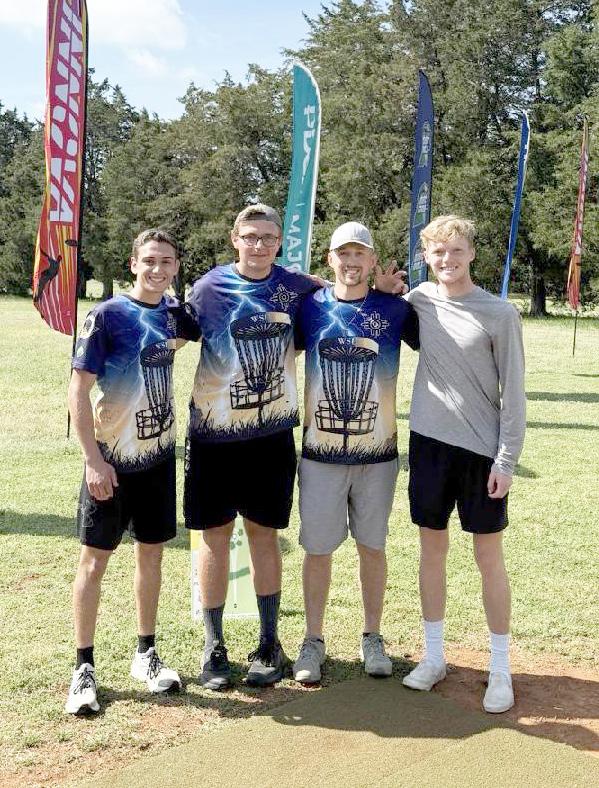
an infection to his finger on his throwing hand, he said he had to rely on the team to help and support him.
“I wasn’t able to throw as far … (I had) this panic of, ‘Oh my goodness; it’s the biggest week for disc golf. I need to be on my A-game,’” Williams said. “My coach and my teammates were all there to support me and also help try to find different ways I could still play… It was super nice to have the team there to support and encourage through that because if it would have been a different group of people, it would have
been the worst week of my life.”
Each of the players still said they had an enjoyable time at the tournament and are already planning for next year.
“I think next year, when we start making preparations for the season and trying to get ourselves back to nationals again, I think we will remember what the experiences were like this year,” Putter said. “Which were positive experiences and want that for the entire team. So I think there’ll be a push there to try to get all three teams, if possible.”
Softball struggles against No. 22 Oklahoma State
BY OWEN PROTHRO owenprothro@gmail.com
Wichita State softball’s struggles against nationally-ranked opponents continued on Tuesday evening.
The Shockers lost to No. 22 Oklahoma State, 10-2, in a five-inning run rule shortened game. The loss to the nationally ranked Cowgirls extended WSU’s losing streak against top 25 teams to 17 straight going back to last season.
Like the other losses to ranked opponents — except for an offensive explosion against then-No. 2 Oklahoma last month — the Shockers’ bats were cold against the Cowgirls, who are now 25-14 and 6-7 in the Big 12 this season. WSU, now 21-20-1 and 9-8-1 in the American Athletic Conference, managed three hits in 17 at bats throughout the game.
Aside from the Oklahoma game, the most hits the Shockers made against a ranked opponent this season were six, against then-No. 9 Florida State and then-No. 24 Florida Atlantic.
One of the three hits came from junior Jodie Epperson, who drove in WSU’s only runs in the first inning with a two-RBI double to center field. Freshman duo Brookelyn Livanec and Gabby Scott made the Shockers’ only other hits in the second and fourth, respectively.
Oklahoma State’s bats were on fire. The Cowgirls hit .500, which included two home runs and four doubles. Oklahoma State managed a run in all five innings.
The Cowgirls did most of the runwrangling in the second, third and fourth innings. They scored three in the second and third, and two in the fourth. Both of Oklahoma State’s homers were in the fourth.
With no run support, the Shockers’ pitching crew needed to step up, but couldn’t.
Freshman Ava Sliger started in the circle and was tagged with the loss. She gave up six runs on as many hits in 2 ⅓ innings pitched. Sophomore Chloe Barber stepped in for relief and gave up four runs on five hits.
WSU’s pitchers combined for five walks and one strikeout.
DECK
@ Tulsa (AAC) Thursday, April 17 4 p.m. *Game one of doubleheader
@ Tulsa (AAC) Thursday, April 17 6:30 p.m. *Game two of doubleheader
@ Tulsa (AAC) Friday, April 18 5 p.m.
vs. UMKC Tuesday, April 22 2 p.m.
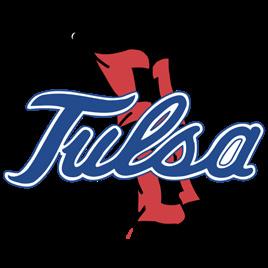


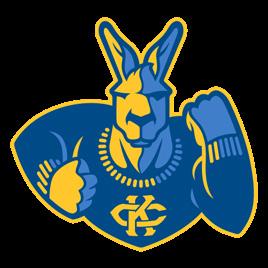
vs. Charlotte (AAC) Friday, April 25 6 p.m.

vs. Charlotte (AAC) Saturday, April 26 6 p.m.

From left to right: Kyle Schluben, Micah Williams, Remington Putter and Joey Wise pose during the College Disc Golf National Championship. The four-day tournament was held in Rock Hill, South Carolina. | Photo courtesy of Remington Putter
‘PEEPS’ THIS

Sunflower staff ranks Peeps marshmallows

mds.200624@gmail.com
As Easter approaches, we as a society must face the ever present truth that hangs over our heads, a truth that must be voiced for the voiceless: Peeps are the best easter candy.
Four staff members on The Sunflower have painstakingly suffered tummy aches and an overly sweet tooth to taste and rank eight different Peeps flavors. Some were so delectable that it was the severe sugar rush and I’m surprised some other flavorsother the flavors made it off of the drawing board.
#8 COTTON CANDY

Assistant Editor Mya Scott: “My mom told me a story where she went to a summer camp and ate like half a pound of Skittles and went into a sugar shock and I feel like this is what I’m going through after eating that.”
The judges decided cotton candy flavored Peeps would rank last in the line-up for the pure that they were too sweet. Eating the cotton candy flavored Peep was the equivalent to dumping a packet of artificial sweetener down your throat, no water, no reprieve.
The overall flavor was also just underwhelming. When people think of cotton candy, they think of a sweet pillow of spun sugar that fills the void of the desire to eat a cloud. This Peep was more like biting into a piece of insulation, peeled straight from the depths of
drywall.
Cotton candy was just depressing and a pressign reminder that just because it’s pretty, doesn’t mean it’s good.
#7 BREYERS COOKIES AND CREAM

The judges held high hopes for the cookies and cream flavored Peep. Unfortunately, it ranked second worst due to the fact that it wasn’t a healthy balance of the two components. Instead of cookies and cream, it resembled just cream and cream. It was the equivalent of biting into a solid block of cream that was churned in the depths of one of those old-timey museums. The specks of chocolate on the white surface were merely a facade, and not a true depiction of the flavor within.
The judges were severely disappointed.
#6 CHOCOLATE DIPPED

Chocolate dipped Peeps were a mystery, at first. The candy just looks odd, with the yellow Peep dipped into a puddle of chocolate on the bottom of it, giving it the appearance of having been dragged through a muddy trough.
Once you get over the look and take a bite, it is slightly reminiscent of a s’more. The chocolate mixed with the marshmallow releases nostalgia of ghost stories by the campfire, perched near a lake. ButHowever, the more bites taken,
the more the nostalgic feeling melts into a blurry puddle of bad textures and too sweet of a mouthfeel.
The judges ultimately ranked this Peep so low due to texture and sweetness level. It wasn’t the worst, but it wasn’t the best and we highly encourage the Peeps brand to take changes into consideration.
#5 PARTY CAKE

This little Peep went straight to the judge’s stomachs and was then forgotten there. The party cake Peep, despite its festive look, was unremarkable and swept up in the high amounts of sugar.
While slightly pleasant at first, it was merely too much and was thrown aside after the initial nibble.
When the looks are better than the best, there is surely a problem.
#4
SOUR WATERMELON
Scott: “I like that it’s a divergent

from the normal sweetness of every peep, and there’s a slight tang to it.”
The sour watermelon Peep was probably the most contested pick of the judging. One half of the judges rated the flavor at a criticalcritically one out of five while the other half deemed this Peep worthy of five stars.
The debate lasted a long while and was ultimately placed in fourth as 75% of thethree out of four judges agreed that it was
better than party cake. At least the flavor was memorable unlike the former.
The design of this Peep was also deemed the best of the bunch along with its unique flavor. Peeps truly used artificial dyes to its advantage with this flavor and it paid off in the end.
It’s a refined taste, but to the judges it was middle ground.
#3 DR. PEPPER

Scott: “It is actually really good … It’s like a better version of the Coca-Cola oreos.”
Reporter Kass Lewis: “So. Good.”
Podcast Producer Taliyah Winn: “I hate Dr. Pepper, and I hate this.”
Reporter Angellica Klingsick: “I don’t know how I feel.”
Moving onto the podium, Dr. Pepper flavored Peeps takes the bronze. This Peep, while some judges were hesitant and even disliked the drink at its core, was solid enough to tug at the heart strings of the judges.
Compared to other popflavored food items — looking at you, Oreos — it truly encapsulates the essence of the beloved soda. The taste was rich and smooth and tasted nearly identical to a fresh bottle of Dr. Pepper.
From now on, any other brand that makes drink-flavored snacks, please contact Peeps isand use them as the standard for drinkflavored snacks.
#2 ORIGINAL

There’s not much to say about this particular Peep. The original was the foundation, the bricks, the soil for the popular candy that now fills kid’s Easter baskets far and wide. It was the basis for all of the fun and unique flavors that now permeate the shelves of the nearest grocery store.
The first time a person eats an original Peep for the first time is not a forgettable experience. It is truly a classic and is never the wrong choice when craving something sweet.
#1 RICE KRISPIES TREATS

The Peep that takes the gold and surpasses all other flavors is the Rice Krispies Treat flavored Peep. To be honest, it was a sleeper pick. All of the more brighter and strong flavors were in line for the top honor, like Dr. Pepper and sour watermelon, but in the end, the consistency and absolute magic Rice Krispies brought to the table was what pushed it ahead of everything else.
It was smooth, it was silky, it was an overall delight to eat and even more delightful to reach for a second one just to experience the joy all over again.
Rice Krispies may not have been what was expected to be on top, but truly has earned its title as the winner, the king, the titan of all Peeps.
It is bananas: WSU workers deserve more than the leftover peel

It is no secret that Wichita State University has money. That much is obvious when you look at the thousands — to even million-dollar — administrator salaries, multi-million-dollar campus plans and golden escape parachutes for disgraced coaches.
But the people who actually keep this university running — custodians, maintenance workers, groundskeepers — are barely getting by. Many are earning around $15.25 an hour. That’s not enough to live on, not even in Wichita, one of the most affordable places in the country. It is insulting for the amount of physical and essential work these employees do every day.
The union representing these workers, WSU Local 6405, is preparing to return to the bargaining table this week. And while the university may try to downplay the union’s influence, the workers understand what collective power can do.
Stephanie Martin, a custodial supervisor currently working in McKinley Hall, compares current wages to the increased prices of basic needs.
“We can’t live on these wages,” Martin said. “You can’t live off three bucks a gallon for gas … eggs went up, groceries, everything’s going up. But we get paid the same.”
The university throws money at PR schemes and new buildings while ignoring the workers who sanitise classrooms, maintain the HVAC systems and supervise schedules of their coworkers. WSU would grind to a halt without them. Yet, somehow, it’s OK to pay them poverty wages?
That’s not just poor budgeting. That’s a choice. And it’s a morally indefensible one.
“People downplay it. ‘Oh, you’re just cleaning.’ But really, you’re physically busting your butt,” Martin said. “It’s not just cleaning — it’s ordering supplies, fixing machines, disinfecting classrooms.”
Martin, who has worked with WSU since 2021, started at a wage of $11.69 hourly.
“When I started, I had seven buildings by myself.”
The workload these employees carry is intense — often bordering on unreasonable. Many are responsible for multiple buildings, and the expectations keep growing as wages stay flat.
But it’s not just about the money. It’s about the complete lack of respect.
“Why is it okay for them to make that much, but not okay for us? We all work. We should all be compensated fairly,” Martin said.
These workers deserve better. And they know it.
Union values passed down in Martin’s family, from her parents. Her dad had been in a union while working at Boeing and often picketed outside. It wasn’t just about wages, but also about respect and job security. The message stuck.
“My dad worked at Boeing — he was in the machinists’ union for years. He always told us, ‘If there’s a union, you join it. They’ll be there for you when nobody else is,’” Martin said. At the top of the university, it’s a different story. In 2023, John Tomblin, who is executive vice president for research and industry & defense programs and executive director of NIAR, earned more than $1 million in salary.
President Richard Muma pulled in nearly half a million. And then there’s former men’s basketball coach Gregg Marshall, who walked away with a $7.75 million severance package after resigning amid abuse allegations.
In addition, the university is moving ahead with a $150 million campus masterplan — including a $7.3 million Wilkins stadium
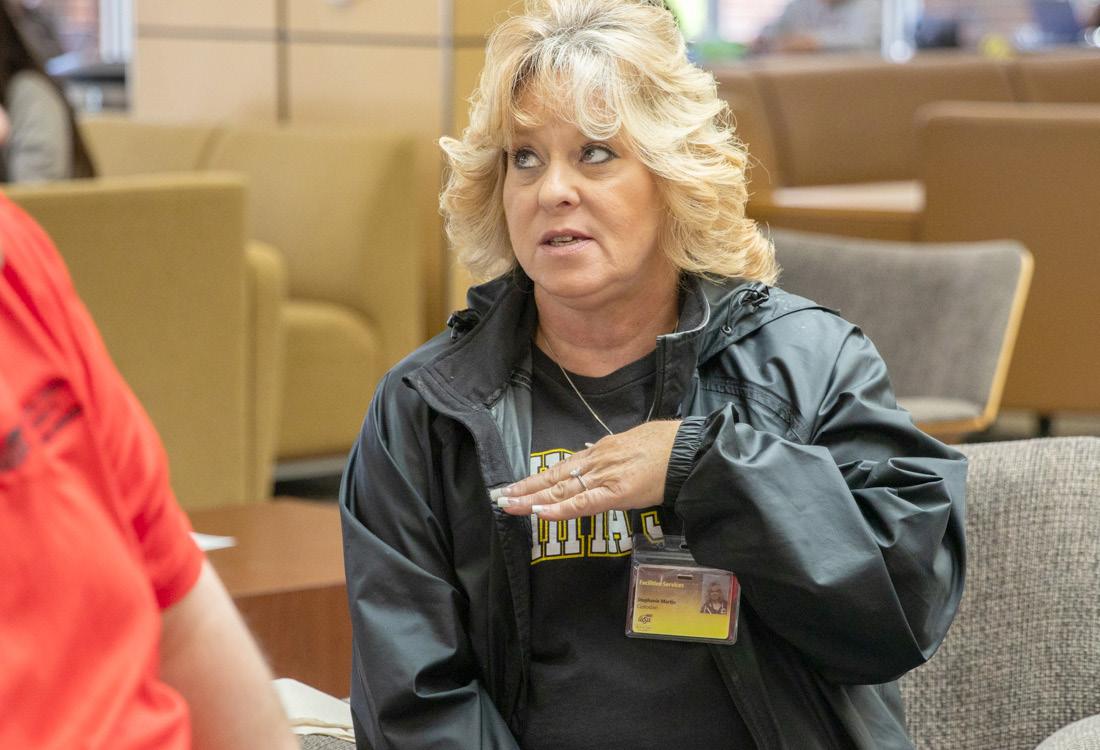
|
renovation. Apparently, there’s always room in the budget for artificial turf and avoiding problems. But not for a living wage. The administration claims all employees should get the same raise percentage. But when someone making $475,000 gets a 1% raise, that’s nearly $5,000 — more than many (if any) of the service workers make in an entire month. 1% of $15 is only 15 cents. Equity isn’t about giving everyone the same. It’s about giving people what they need and deserve. It is about fairness, not formulas. Even with better-paying
options elsewhere, some workers stay because they care about the campus. That loyalty shouldn’t be exploited.
But they shouldn’t be fighting alone. Students, staff and the public need to step up and speak out. That’s what a campaign is about. If you see a banana sticker this week, it’s not a joke. It is a protest. A cry for justice. A reminder of how absurd — bananas — it is that WSU workers are being paid like this. The university has the money. It doesn’t have the will, and that’s not acceptable.
Photo by Angellica Klingsick / The Sunflower
Stephanie Martin, a second shift custodial supervisor, shares why she joined the WSU Local 6405 union, which represents WSU facilities and maintence employees. Martin and other union members tabled in the Rhatigan Student Center on Tuesday, April 15.
Photo by Allison Campbell / The Sunflower
MUSICAL MANIA
Wichita State’s Musical Theatre Company did a production of ‘The Guy Who Didn’t Like Musicals,’ a show about a town taken over by musical demons that force their hosts to sing and dance or die.


Nicholas Dreier chokes Joshua Duran. Dreier’s character was a part of the government operation P.E.I.P., a special unit that was
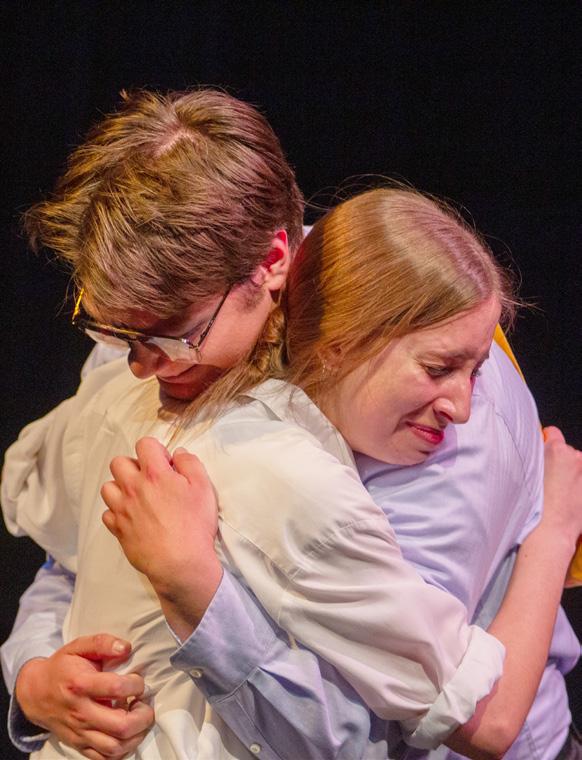


The one fairy ring safe to walk into: Annual Pride Prom hosted in Marcus Welcome Center
BY SOPHIA
As a way to celebrate GAYpril, Spectrum: LGBTQ & Allies, Wichita State’s social and discussion group for the LGBTQ+ and ally community, hosted its annual Pride Prom on Saturday, April 12.
This year’s theme, “Captured by the Fae!” gave students and guests a chance to tap into their whimsical side as well as celebrate in a way many weren’t able to in
high school.
“It’s just a safe space for students who weren’t able to be out at their high school proms,” Moe Hatfield, a member of the Pride Prom committee, said. “It’s just kind of a feel-good spring event.” Participants walked into the Marcus Welcome Center and were greeted with fairy lights, mushrooms and a smoke machine, setting the mood. Attendees were also able to enjoy catered food and a photo station.
The photo station came in

It’s not about everyone being gay; it’s about everyone being accepting.”
VINCENT FARWELL Ambassador at-large, Spectrum “
handy, as many came dressed to impress to match the fantastical theme.
“I was looking forward to
wearing this cute dress I bought,” Nia Evbota-Momodu, a freshman psychology major, said. “It’s got a big belt, elven sleeves, a tunic shape and a pair of fairy wings along with it.”
Besides the opportunity to meet other students, Pride Prom gave students a chance to connect with their partners. Vincent Farwell, an ambassador at-large for Spectrum, invited his girlfriend from Texas as his date. She made the longdistance drive to Wichita for the event.
“I went to school in Texas, and I went with a trans man who hadn’t really transitioned yet,” Farwell said. “So having Pride Prom is really important because it gives students an opportunity to have the prom that we wanted … It’s not about everyone being gay; it’s about everyone being accepting.” Students interested in future Spectrum events, including a karaoke night on April 17, can find additional information on it’s Instagram and Facebook accounts.
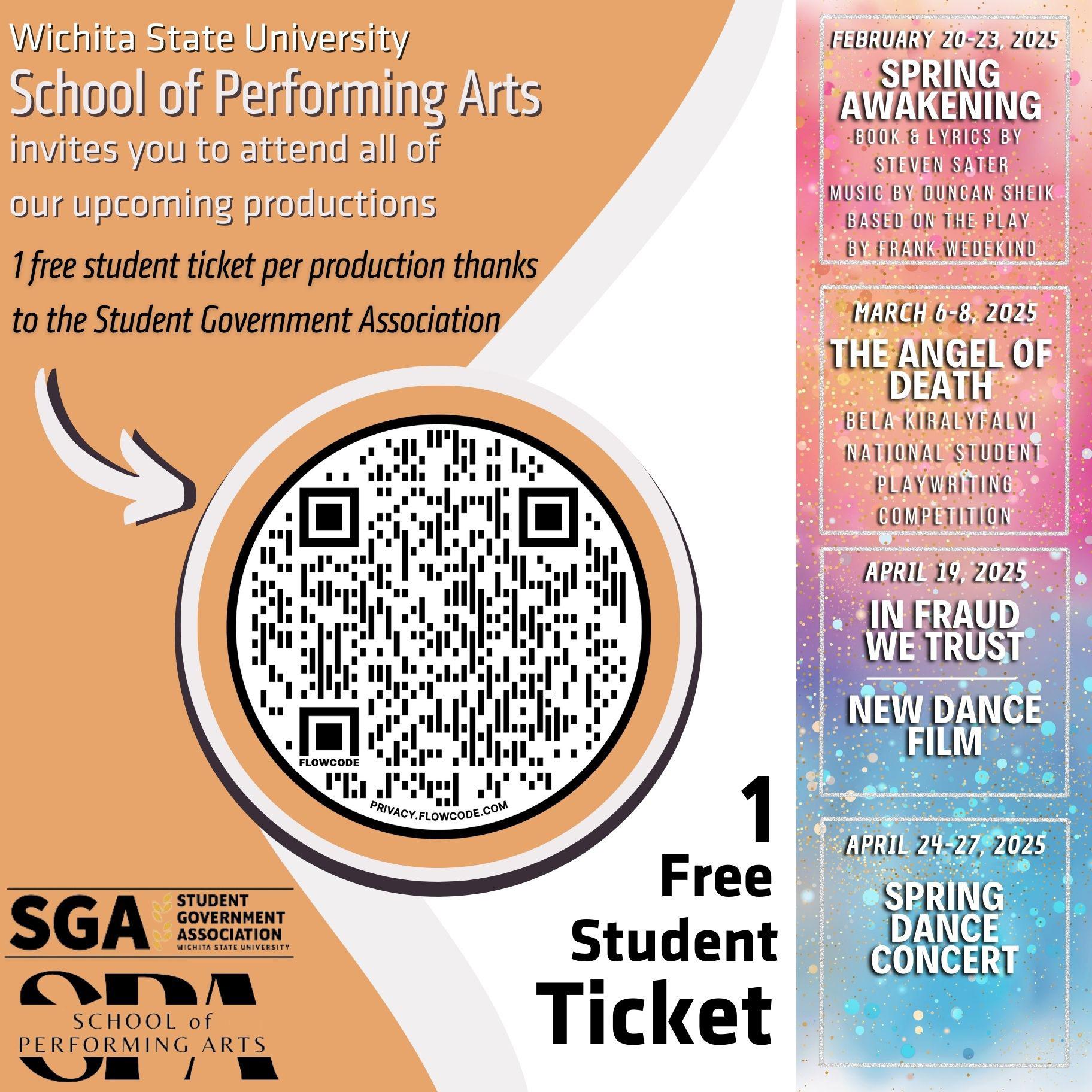
Elena Cianciolo holds out her arms and smiles creepily at the audience. Cianciolo was performing the musical number “Join
Us (And Die).” | Photos by Mya Scott / The Sunflower
Musicals.”
Joshua Duran slams his hand onto the coffee counter. Duran’s character, Paul, was in hysterics after witnessing his boss sing and hearing his love interest, Emma sing at the coffee shop she works at.
designed to deal with the strange and paranormal.
Joshua Duran and Aubrey Johnson hug on stage as their characters are reunited after almost dying.
PLUNDERING THE PIRATES
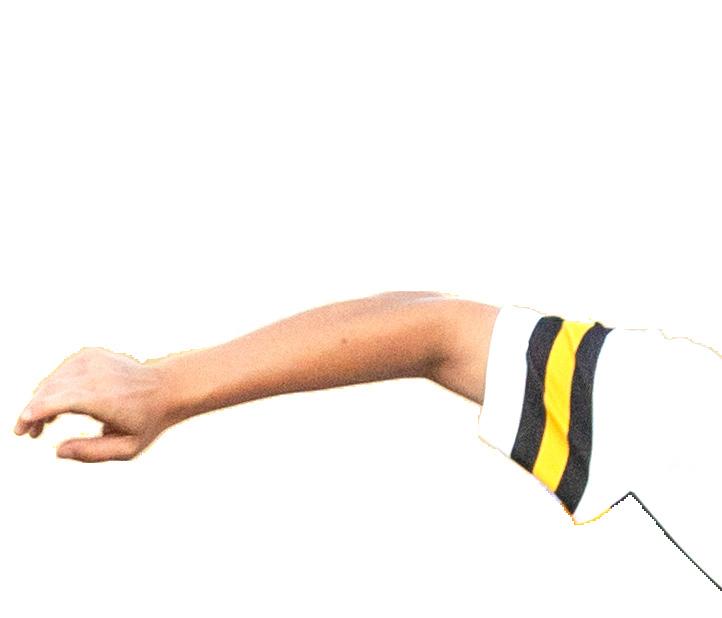

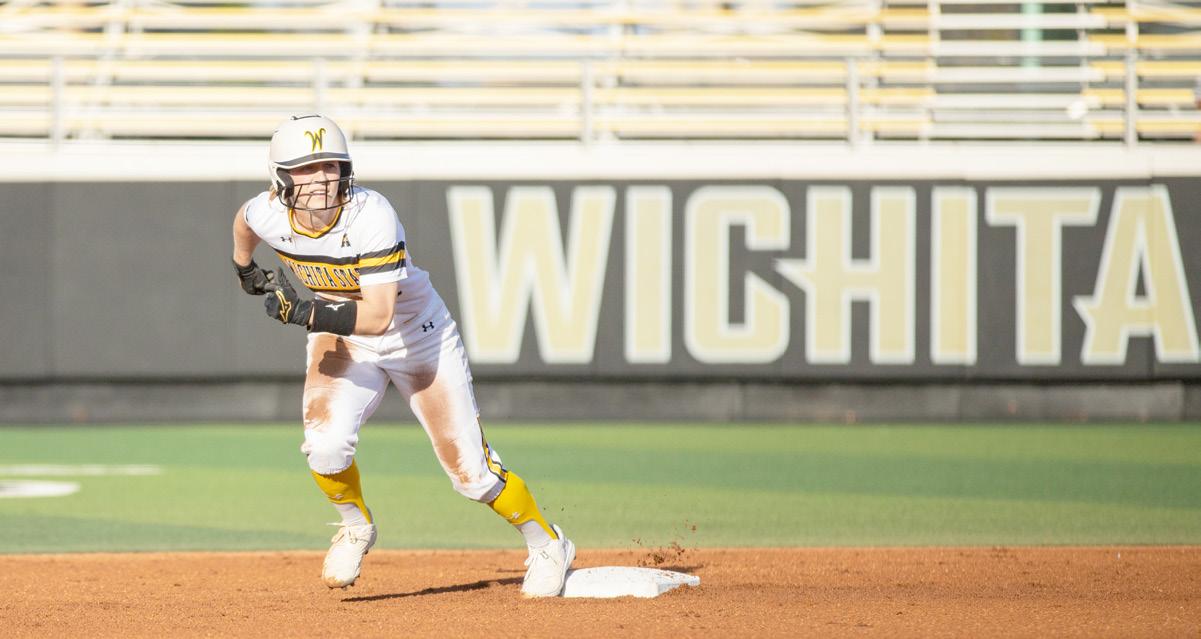
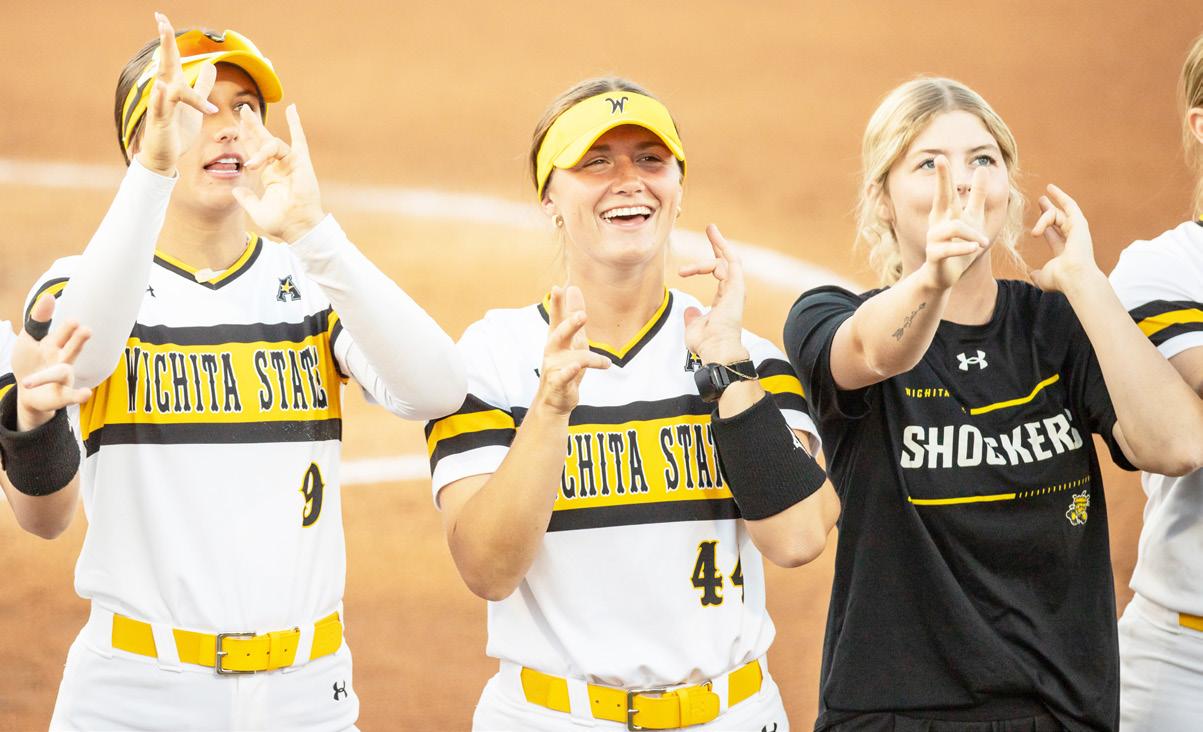
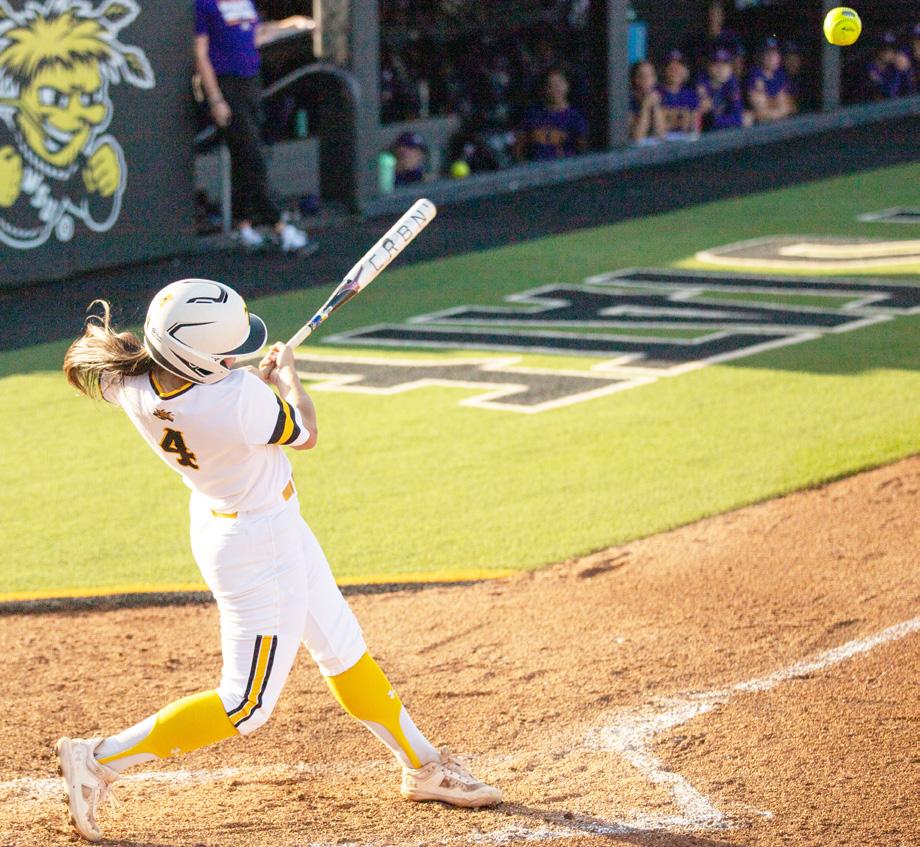
Softball offense leads to series win against East Carolina


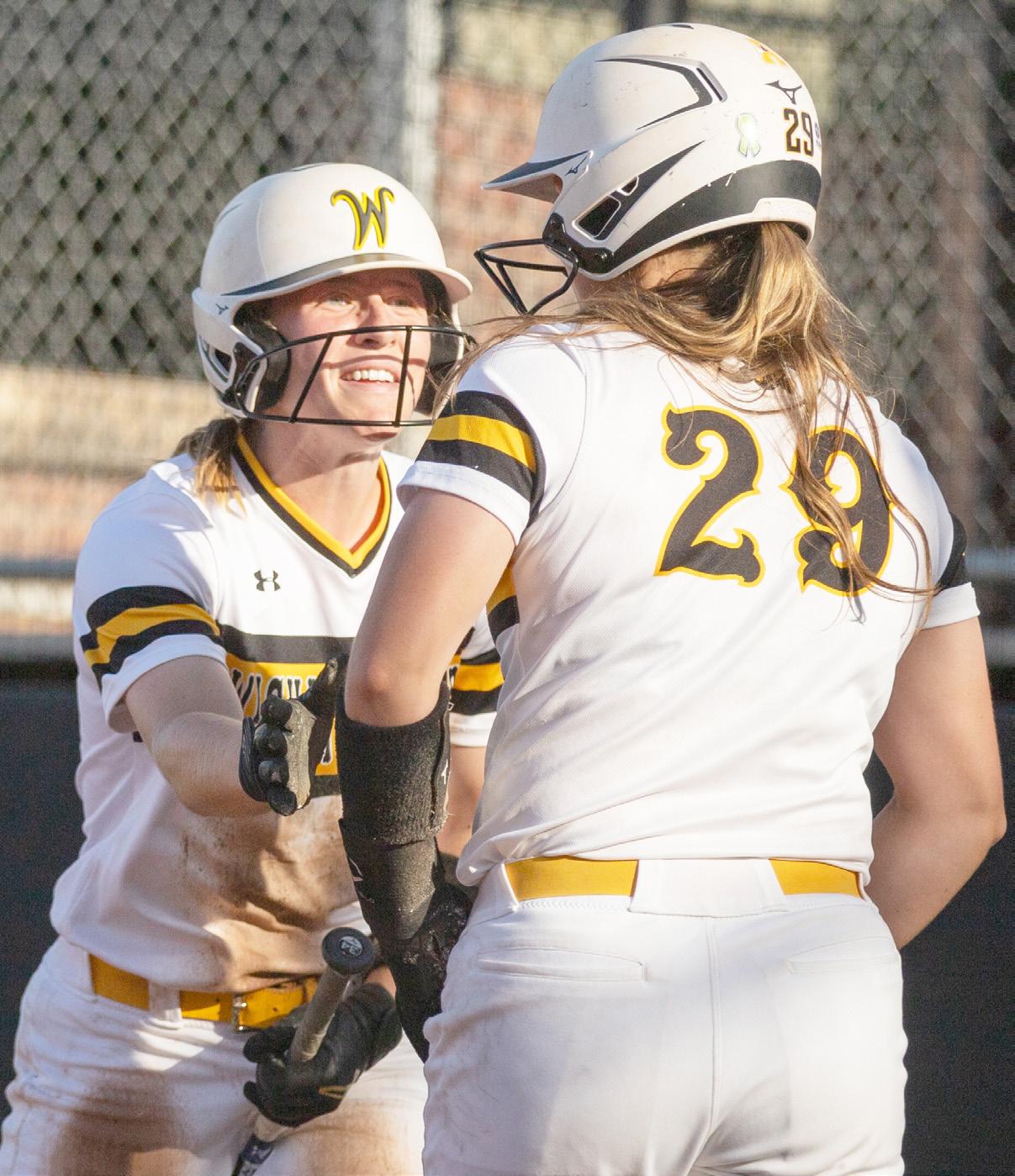

SHOCKER SCIENCE
CONVENTION: TALES OF ASTRONAUTICS FROM THE AIR CAPITAL OF THE WORLD
SATURDAY, APRIL 19
12:30 - 2 p.m.
Ulrich Art Museum, Dr. Sam and Jacque Kouri Collection Study Center
Join Atri Dutta for a lively discussion on astrodynamics, the study of spacecraft motion under the influence of gravity. Learn about the research conducted at Wichita State University’s Astronautics Laboratory, such as solar-electric propulsion, missions like NuSol and SNAPPY and monitoring hurricanes from space. This event is free and open to the public.
FILM PREMIERE OF ‘IN FRAUD WE TRUST + DANCE FILM’
SATURDAY, APRIL 19
7:30 - 9:30 p.m.
Eugene M Hughes Metropolitan Complex, Welsbacher Theatre, entrance on southeast side
The School of Performing Arts presents “In Fraud We Trust + Dance Film,” which combines four short comedic films in collaboration with the School of Digital Arts. Students can get a free ticket in advance at the Fine Arts Box Office in Duerkson Fine Arts Center, by phone at 316978-3233 or online at wichita.edu/ fineartsboxoffice. Sales at the box office are suspended three hours before the performance and open up again one hour before the event. Tickets are $15 otherwise.
SHOCKER SWAG SWAP
MONDAY, APRIL 21
4 - 6 p.m.
Hubbard Hall lawn
Hosted by the Office of First-Year Programs, this event invites students, faculty, staff and other community members to swap their gently used Shocker gear for newto-you items. Bring shirts, mugs, lanyards and any other Shocker items for this free event.
COMMUNITY ENGAGEMENT INSTITUTE SPRING 2025 VIRTUAL WORKSHOP SERIES: RISING TO THE CHALLENGE
WEDNESDAY, APRIL 23
11 a.m. - noon
The WSU Community Engagement Institute is holding the next interactive workshop centered on adjusting to change. All five workshops last an hour, with this installment being centered on “Effective Communication During Change” held by Percy Turner. Register for this free online event at wichita.edu/rttc/spring2025. The next installment of the series, “Navigating Change: Understanding Resistance and Facilitating Adjustment” by Carri Wead, will take place on April 30.
HIDDEN SCIENCE IN ENGINEERING MATERIALS
THURSDAY, APRIL 24
3 p.m.
Woolsey Hall, Room 110A
(Auditorium #1) This seminar hosted by NIAR and the College of Engineering will feature talks from James C. Ho, Ramazan Asmatulu and Rachael Andrulonis. These talks will discuss the benefits of using scientific insights as opposed to standard empirical testing with usage data for the development and evaluation of human-invented applied materials. These talks will vary in subject from low-temperature calorimetry’s interaction with certain materials, to the failure mechanism of fiber reinforced composites for aviation and qualification of additively manufactured metals.
HAVE AN EVENT YOU WOULD LIKE LISTED?
CONTACT THE ARTS EDITOR: arts@thesunflower.com CONTACT THE NEWS EDITOR: news@thesunflower.com
Junior Sami Hood sends the ball toward third base during the game against the East Carolina Pirates on April 11. Wichita State won the match, 11-2.
Before the start of the match against East Carolina University, members of the Wichita State softball team circle and play a warmup game. The Shockers run ruled the Pirates in a 11-2 win in one of three matches on April 11.
Graduate student Ellee Eck congratulates junior Taylor Sedlacek after a successful run during the first game of a three-part series against East Carolina University. The Friday win propelled the Shockers into the rest of the weekend’s success.
A Shocker fan uses a bubble gun following Wichita State’s first home run against East Carolina University on April 11. The 11-2 win propelled the Shockers into the rest of the successful weekend.
Graduate student Ellee Eck loads up on second plate, preparing to run during the game against East Carolina University on April 11. Eck scored three times and secured a pair of hits and an RBI during the game.
Senior Camryn Compton and her teammates celebrate with the WSU crowd after a run-rule victory against the East Carolina Pirates on April 11.
Freshman Ryley Nihart pitches in the first game of a three-game series against East Carolina University on April 11. Nihart led the Shockers to an 11-2 victory.
